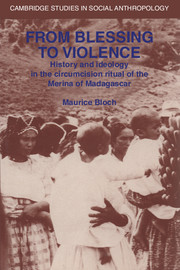Book contents
- Frontmatter
- Contents
- Preface
- 1 The social determination of ritual
- 2 Background politico-religious history of the Merina, 1770–1970
- 3 Background to Merina social organisation and religion
- 4 Description and preliminary analysis of a circumcision ritual
- 5 The symbolism of circumcision
- 6 The myth of the origin of circumcision
- 7 The history of the circumcision
- 8 The circumcision ritual in history: towards a theory of the transformation of ideology
- Notes
- References
- Index
- CAMBRIDGE STUDIES IN SOCIAL ANTHROPOLOGY
3 - Background to Merina social organisation and religion
Published online by Cambridge University Press: 05 June 2012
- Frontmatter
- Contents
- Preface
- 1 The social determination of ritual
- 2 Background politico-religious history of the Merina, 1770–1970
- 3 Background to Merina social organisation and religion
- 4 Description and preliminary analysis of a circumcision ritual
- 5 The symbolism of circumcision
- 6 The myth of the origin of circumcision
- 7 The history of the circumcision
- 8 The circumcision ritual in history: towards a theory of the transformation of ideology
- Notes
- References
- Index
- CAMBRIDGE STUDIES IN SOCIAL ANTHROPOLOGY
Summary
The historical processes outlined in the preceding chapter have meant that present-day Merina society is extremely diversified. Many Merina live in towns, especially in the capital, Antananarivo; many live abroad in France and Réunion; but many still live in the countryside of Imerina or beyond, often in new lands they have colonised during this century.
The way of life of the Merina and their class affiliations are as varied as the places where they live. There are rich Merina businessmen and professionals and poor urban slum dwellers; there are wealthy merchants and small-scale agriculturalists. What links these people together is their reference to a common historical past, as well as their kinship system, which ensures that some of the ancient groupings are reproduced.
Fundamental aspects of Merina social organisation
The social division coming from the past that is probably still most relevant to them is that between the descendants of freemen and those of slaves. The descendants of freemen do not usually intermarry with the descendants of slaves. This has great significance in that since richer Merina are mainly of free descent, so the marriage barrier reproduces in terms of wealth the difference in precolonial status.
The distinction between slaves and freemen also has importance for kinship. The descendants of slaves tend to form a relatively undifferentiated group. They intermarry freely and kinship ties among them form the typical undifferentiated web of bilateral societies. They have no notion of descent groups.
- Type
- Chapter
- Information
- From Blessing to ViolenceHistory and Ideology in the Circumcision Ritual of the Merina, pp. 34 - 47Publisher: Cambridge University PressPrint publication year: 1986
- 1
- Cited by

